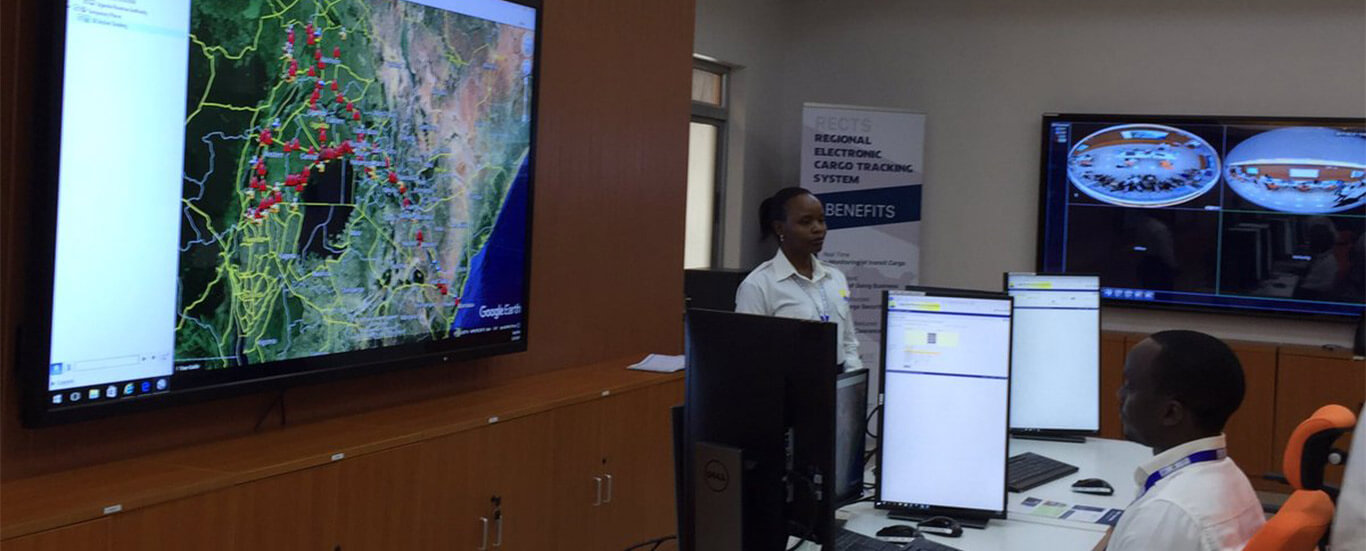USD4.4 Million Regional Electronic Cargo Tracking System was unveiled today and will further reduce transit time, cargo theft and diversion of goods in transit
Kampala, 24th Feb 2017: Revenue Authorities in Kenya, Uganda and Rwanda have officially unveiled a Regional Electronic Cargo Tracking System (RECTs) enabling them to jointly track movement of goods from port to destination electronically; that is from Mombasa Port to Kampala and Kigali. The system will reduce the cost of doing business by reducing transit time, enhancing cargo safety and helping traders to better predict arrival of goods. The service will be free as Revenue Authorities will meet all operational costs.
Speaking at the unveiling of the system at Uganda Revenue Authority offices at Nakawa, Kampala, – URA Commissioner General Doris Akol said, “The partnership with Kenya and Rwanda helps us monitor goods from end to end, easing cargo handling, improving revenue collection and reducing diversion of un-taxed goods into the market. It will lead to improved fair trade as goods that have not been taxed will not be diverted to distort the market. This will benefit our traders and assure potential investors of level playing field in our region”.
The United Kingdom Department for International Development (DFID) has supported the project by giving USD4.4million grant through TradeMark Africa.
A DFID official said “DFID is proud to be partnering with Government of Uganda, and with key partners including TMA, to reduce Uganda’s barriers to trade with the rest of the world. Increasing Uganda’s trade with its neighbors is vital for generating growth and promoting jobs and income, which we know is the surest way to reduce poverty. The launch of the Regional Electronic Cargo tracking System marks an important milestone towards our shared goal of reducing by a third the time to import and export goods from Uganda”
RECTs comprises satellites, central command centres in each of the revenue authorities in Nairobi, Kampala and Kigali, smart gates and rapid response units. An electronic seal is attached on transit cargo vehicles and communicates with the command centres giving real time updates such as vehicle location, speed, and if the container is tampered with or not. Importers, transporters, and the revenue authorities can see this information. Rapid response units are stationed along sections of the Northern Corridor identified as notorious for diversion of goods. These rapid response units respond to alerts, received from the command centres, about suspicious behaviour like diversion from designated route, unusually long stop over, or attempt to open a container, which they investigate and resolve on the spot.
Expected gains: The system will enable transporters to reduce their transit costs and increase the productivity of their fleet. Kenya, Uganda and Rwanda will seal loopholes that lead to revenue loss because of diversion of un-taxed goods into the market. RECTs will eliminate the need for physical escort and monitoring of sensitive cargo, such as batteries, fuel, cigarettes.
Frank Matsaert, TMA CEO said, “Transit trade is an important element of any economy and we are glad to be the catalyst of this partnership. RECTs is one of the many innovations that TradeMark is supporting and which is geared towards easing and improving local and international trade in East Africa. RECTs efficiency will ingrain fair terms of trade by creating a level playing field for both importers and local industries as it helps in eliminating diversion of cargo. Surely, with this strong partnership between the private sector, the revenue authorities and TMA it is possible that we can reduce transit time from Mombasa to Kampala down to 2days”
KRA, URA and RRA hope to work with other revenue agencies in the region to continue integrating their systems and further simplify trade. Speaking at the event, TMA Uganda Country Director Moses Sabiiti said, “The RECTS is building on the excellent results delivered by the first phase of the Electronic Cargo Tracking System in Uganda, which reduced transit days from an average of 6 days (December 2013) to 1.5days for truckers moving from Busia to Elegu (the border with South Sudan.) TMA is grateful to the UK Government for funding the automation of URA that forms the backbone of URA transformation. The support has enable URA to improve capacity in business process management through automation of all customs stations and training. TMA will further support GOU implement a comprehensive cross border strategy that will increase participation SMEs and women so they can benefit from these trade interventions”.
TradeMark Africa (TMA) is an aid-for-trade organisation that was established with the aim of growing prosperity in East Africa through increased trade. TradeMark Africa (TMA) operates on a not-for-profit basis and is funded by the development agencies of the following countries: Belgium, Canada, Denmark, Finland, the Netherlands, UK, and USA. TradeMark Africa (TMA) works closely with East African Community (EAC) institutions, national governments, the private sector and civil society organisations.















